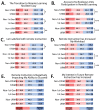Disparities in Remote Learning Faced by First-Generation and Underrepresented Minority Students during COVID-19: Insights and Opportunities from a Remote Research Experience
- PMID: 33884088
- PMCID: PMC8046656
- DOI: 10.1128/jmbe.v22i1.2457
Disparities in Remote Learning Faced by First-Generation and Underrepresented Minority Students during COVID-19: Insights and Opportunities from a Remote Research Experience
Abstract
The COVID-19 pandemic forced an unprecedented shift to remote instruction across higher education, reducing access to critically important undergraduate research experience and potentially magnifying inequities faced by first-generation and underrepresented minority (URM) students in higher education. Through a novel course-based undergraduate research experience (CURE) at UCLA, delivered completely online, results of a unique, student-generated survey showed that the transition to remote learning was challenging for all students, increasing student workload, decreasing ability to focus on school, and limiting their ability to succeed. However, results showed significant disparities in remote learning that disproportionately impacted URM and first-generation students. These students had significantly greater expectations to help siblings with remote learning,; URM and first-generation students also suffered greater economic and food insecurity related to COVID-19. At the same time, this study demonstrates how student voices in survey development provide novel and actionable insights. While access to CUREs is often limited by laboratory space, by focusing on the research process, rather than specific laboratory skills, this study provides a scalable pedagogical model for remote undergraduate research experiences. Importantly, this model fostered student engagement and increased interest in further undergraduate research, including topics not directly related to the subject of this study, suggesting that online CUREs can be effective and impactful.
©2021 Author(s). Published by the American Society for Microbiology.
References
-
- Nagda BA, Gregerman SR, Jonides J, von Hippel W, Lerner JS. Undergraduate student–faculty research partnerships affect student retention. Rev Higher Ed. 1998;22(1):55–72. doi: 10.1353/rhe.1998.0016. - DOI
-
- Espinosa L. Pipelines and pathways: women of color in undergraduate STEM majors and the college experiences that contribute to persistence. Harvard Ed Rev. 2011;81(2):209–241. doi: 10.17763/haer.81.2.92315ww157656k3u. - DOI
-
- Hathaway RS, Nagda BA, Gregerman SR. The relationship of undergraduate research participation to graduate and professional education pursuit: an empirical study. J Coll Stud Dev. 2002;43(5):614–631.
LinkOut - more resources
Full Text Sources
Other Literature Sources


